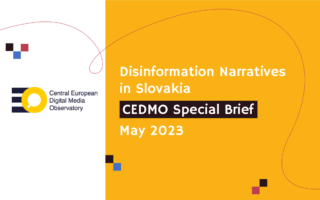What's
CEDMO survey: Conspiracy narratives in the Czech Republic
A recent CEDMO study, part of the ongoing CEDMO Trends survey, has unveiled compelling insights into the media consumption behavior of the Czech population, particularly focusing on information disorders like misinformation and disinformation. As a part of the CEDMO project, we find this study not only intriguing for the Czech Republic but also believe its findings could offer valuable insights for Slovakia.
The tenth wave of the longitudinal thirty-month CEDMO Trends survey has been conducted monthly since March 2023 by the research agency Median for CEDMO consortium at Charles University. The long-term survey offers exceptional insight into the evolution of the population’s behavior in the consumption of different types of media and media content, focusing on particular kinds of information disorders such as misinformation and disinformation. The questions for the tenth wave of the survey were collected from a representative sample of the general population of the Czech Republic during January 2024. More than 3.000 respondents aged 16 and older were surveyed. This wave included a set of questions related to current social events; the shooting at the Faculty of Arts of Charles University and the closely related issue of the legislative regulation of gun ownership in the Czech Republic.
The disinformation narrative about the Ukrainian origin of the murderer who killed a thirty-two-year-old man and a two-month-old girl in the Klánovice forest in mid-December was recorded by the highest number of respondents of all false narratives monitored in the tenth wave of the survey (21%), most often younger people, generally people with lower education and everyday internet users.
The second largest reach (17%) had the narrative that the mass shooting at the Faculty of Arts of Charles University on 21 December 2023 was merely a staged spectacle aimed at fundamentally tightening gun legislation in the Czech Republic.
Consistently, in the case of both false narratives mentioned above, 2% of respondents said that they had spread the information further (most often people without high school diplomas, people from Prague and Central Bohemia, and again, everyday internet users). Meanwhile, 18% of the respondents considered the report about the staged shooting to be credible (of which 6% considered it to be completely credible).
Media coverage of the shooting at Charles University was factual and professional
Among the information sources from which the respondents drew most information on the day of the mass shooting, 56% of them mentioned their favorite TV station, 35% mentioned search engines (Google, Seznam, etc.), 26% mentioned their favorite news portal, and 17% mentioned social networks, their favorite radio station, friends, acquaintances and family members as sources.
More than two-thirds of people also agree that the information provided to the public on the day of the mass shooting was factual and professional on the part of the Police and the Minister of the Interior. The same proportion of respondents also considered the way in which the public service media (Czech Television and Czech Radio) reported on this tragic event to be in line with the high ethical standards of journalistic work. Respondents also rated the way in which most private news media reported the news as factual and serious.
The overwhelming majority of respondents (73%) agreed that social networks should be able to delete hateful posts spread in connection with the shooting. Women and seniors over 65 years of age are more likely to believe this. “Somewhat surprisingly, the youngest cohorts under 24 also hold the same view, albeit with less determination. In addition to them, also SPOLU voters and PirSTAN voters and Petr Pavel voters in the presidential elections,” comments Lukáš Kutil, a data analyst at CEDMO, adding: “The biggest opponents of deleting content on social networks can be found among voters of Svobodní, Trikolora and Soukromníci and among the high school educated population.” At the same time, more than half of people (55%) think that posting risky videos and photos of shootings is in the public interest.
Among institutions, the police and the military are the most trusted
A majority of the Czech population trusts the Police of the Czech Republic (60%) and the Army of the Czech Republic (54%), while less than half trust the traditional news media such as the press, radio or television (47%) and the courts (46%). Respondents showed the lowest trust in social networks (15%) and domestic political parties (6%). The government and parliament are not trusted much either, with only a quarter of the population trusting them.
Most people consider the right to own a gun to be right, but are in favor of stricter legislation
The provision of the right to defend one’s life with a weapon, which is enshrined in the Charter of Fundamental Rights and Freedoms as part of the constitutional order in the Czech Republic, is considered correct by 67% of respondents – among them more often men, the university educated and all age groups over 24. Regarding economic activity, entrepreneurs and self-employed persons like the provision the most, while students like it the least.
“It is noteworthy that the respondent’s identification on the scale of political affiliation to liberalism or conservatism plays no role in this question; both opposites are almost identically represented in the positive answer. On the other hand, there is also a strong demand for stricter gun laws in the respondents’ answers – 62% of them agree with the statement that gun and ammunition laws should be stricter than they are today,” says Lukáš Kutil.
Gun ownership based on a firearms license was cited by 3% of the population. At the same time, most respondents do not have a correct idea of gun ownership in the Czech Republic. Only a quarter (25%) correctly estimated the number of gun license holders in the country, and less than a quarter of the number of registered guns (24%).
Trends:
- the proportion of respondents who feel they have not been exposed to misinformation at all is increasing,
- true narratives are losing credibility
- the number of chain emails is decreasing
The sub-waves of the longitudinal survey show an increasing trend in the number of respondents who feel that they have not been exposed to misinformation at all during the reporting period. In the latest (tenth) wave of the survey, the proportion of such respondents reached 38%. This is almost double the increase compared to the first wave of measurement in March 2023 (22%). At the same time, the downward trend in trust in truthful narratives continues. Based on continuous measurement over several months, it can also be noted that the number of people who did not receive any chain email in the reporting period is increasing. While in the first wave, 56% of respondents declared that they had not received a chain email, in the current tenth wave of measurement, 66% have already given this answer.
CEDMO Trends is a unique longitudinal panel survey conducted over a period of thirty months. It offers exceptional insight into the evolution of the population’s consumption behaviour of different types of media content, focusing on particular types of information disorders such as misinformation and disinformation. These not only undermine public trust in the institutions necessary for the functioning of a pluralistic democracy but can also amplify individual infodemias. It is being carried out by the research agency Median for CEDMO.


